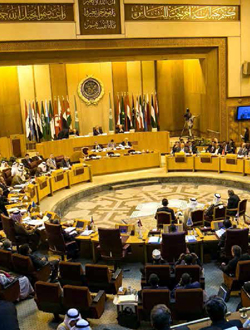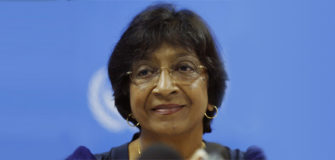Can the Middle East Be Fixed?

 Yes. Amid the chaos and bloodshed, there may be a historic opportunity
Yes. Amid the chaos and bloodshed, there may be a historic opportunity
History tells us that regional cataclysms can galvanize states to reconsider and renegotiate long-held positions and postures. They provide an opportunity to challenge conventional wisdom and to look for new ways of doing business. Even adversaries have to recalibrate when interests suddenly converge or demand a deviation from what was once considered normal behaviour. There may be realignment and reconsideration of alliances. Witness the emergence of today’s 28-member EU from the ashes of WW2, or the growing calls for a comparable 21st century institution for the Asia-Pacific region.
The Middle East finds itself at a critical juncture in its history. Yet another crisis confirms the growing imperative to reconstruct and reconstitute its outdated regional order through indigenous leadership, initiative and design. The rise of ISIS and the security threat that it presents to Iraq and Syria, and perhaps other states in the region demands a coordinated regional response. The need for such a regional solution only adds to the strength – indeed, urgency – of the case for the establishment of a regional security framework in the Middle East.
As long as Middle Eastern states do not assume collective ownership of the long list of security challenges that plague the theatre, and otherwise fail to create effective mechanisms for security dialogue and conflict management – and, just as importantly, as long as the region’s security is farmed out to outside powers – the region will continue to be plagued by the acute security dilemmas that have driven its chronic instability.
The dysfunctional order that defines today’s Middle East has been shaped by critical events in both ancient and modern history: the Arab invasion of Persia in 633 AD, the Battle of Chaldiran and Ottoman-Safavid (Sunni-Shia) regional rivalry in the 16th century, WW1 and its colonial legacy, the 2003 invasion of Iraq, the Arab Spring, and now the Arab Winter. All of these and many more have contributed to the complex regional landscape, including its myriad sectarian divisions.
Grand external designs in the 20th century to shape the region into a satellite order that largely served Western interests, without due regard for, or adequate understanding of, the region’s diverse religious, cultural, linguistic, historical and political realities led to frictions and conflicts that fester to this very day. As we know, European annexation of the region – especially by the UK and France – was directly responsible for the creation of multiple fragile states after the collapse of the Ottoman Empire in 1923. These states have ever since been ridden with internal pressures – not easily mastered – and major cross-border and international tensions.
Consider, in more recent history, Saddam Hussein’s invasion of Kuwait in 1990. Apart from Baghdad’s interest in that country’s oil wealth and a desire to cancel out the sizeable debts owed by Iraq to Kuwait arising from the Iran-Iraq war, Iraq’s aggression was also largely premised on its historical ties and purported claims to Kuwait. In fact, the separation of Kuwait from contemporary Iraq was very much a deliberate imperial project to bolster London’s regional influence in the Persian Gulf and to secure a strategic outpost to safeguard British interests in India. Iraq itself was annexed by the British without much regard or appreciation for the tribal, sectarian and cultural realities on the ground – Kurds, Assyrians (mostly Christians), Turkoman, Sunnis, Shia, etc. Consider also Lebanon, its confessional politics, and the destructive Lebanese Civil War (1975-1990), as well as a host of other examples in the region where colonial tampering has contributed to regional incoherence and angst. In short, the Middle East as it exists today is largely the product of poor external geostrategic engineering, rather than indigenous invention and planning. It is an archaic, failed order in need of reform.
The 2003 invasion of Iraq and the Arab Spring unleashed unpredictable and violent forces. The absence of democratic traditions and institutions across most of the region, coupled with the sudden weakening of many strong central governments, upended the logic of the region’s already weak and incoherent security and governance structures.
Building on the region’s costly historical experiences and hyper-volatile security landscape, we may today be observing an intellectual and strategic paradigm shift among a number of leading regional thinkers and actors – a shift that suggests that leaders and states in the region may before long be disposed to committing themselves to serious diplomatic engagement in respect of a more comprehensive approach to regional security. Early signals of Saudi-Iran détente precipitated by the threat of ISIS highlight the severe security crisis facing the region today. They also hint at opportunities to foster regional solutions to regional problems. Mentalities may be changing, or being changed by strategic forces, to no longer see geopolitical interaction as zero-sum.
What are these leaders and states seeing? Answer: alarmingly frequent hot wars; the threat of nuclear proliferation; and, among many other problems, continuous threats of cross-border terrorism by potent non-state forces – like ISIS. They see a regional order that is not only highly unstable, but inching toward collapse. They see a region with countless instances of mass atrocities, incapable of adequately addressing such odious crimes or deterring their commission. (Note: The fact that the Middle East is one of the most underrepresented regional blocks of States Parties at the International Criminal Court certainly does not help this impunity gap.)
For all of its ills – and likely also because of them – the Middle East is one of the world’s most strategically significant regions. Stunningly, perhaps, the region does not yet have in place the necessary institutions and mechanisms to discuss and manage, and to prevent and respond to crises. Strategic and visionary leadership is required to reverse the state of the region.
A first move must be the establishment of a standing regional security forum to discuss issues of strategic concern, from nuclear proliferation and cross-border terrorism to drug trafficking. Core regional states should champion and initiate such a project with the support of other Middle Eastern capitals and the international community. Let me suggest that, in the present circumstances, the first edition of this regional security summit should be jointly organized or hosted by the likes of Turkey, Iran, Saudi Arabia and Iraq. The central focus of the agenda should be the threat posed by ISIS and the contours of a collaborative, sustainable regional solution to the menace. The agenda could also plant the seeds for a region-wide strategy to address cross-border terrorism – a longer-term effort that would be in keeping with the idea that the security forum should be a logical precursor to a more comprehensive security architecture for the Middle East.
Ours is an age of regionalism – that is, of an emerging global order wherein different regions will increasingly interact and compete with one another. Collective strength and common security will be key to individual country success. The Western world is ahead of this newly emerging great game. Eurasia, Asia and the Middle East – all theatres of past and present conflicts and candidates for more conflagrations in the future – are notably behind. For Middle Eastern leaders, then, the reconstruction of the Middle East security order is the ultimate test of statesmanship in our time.
Western capitals, for their part, have every interest to support regional security in the Middle East – that is, a regional order not based on the corrupt and violent ideologies of groups like ISIS, but one that is pluralistic, peaceful and productive, and designed to engage constructively with the rest of the world. As Henry Kissinger observes in his latest book World Order, “[t]he contemporary quest for world order will require a coherent strategy to establish an order within the various regions, and to relate these regional orders to one another. […] A world order of states affirming individual dignity and participatory governance, and cooperating internationally in accordance with agreed upon rules [and with respect for international law], can be our hope and should be our inspiration.”
In the tumultuous theatre that is today’s Middle East lies a historic opportunity – the opportunity to reverse the degenerative course of the region and to secure for it a bright and promising new century. A first diplomatic security conference, by and for the region, with the support of the international community, must be organized as a matter of priority.
![]()
Sam Sasan Shoamanesh is the managing editor of Global Brief. The views expressed in this article are the author’s alone.











